Holy Tuesday evening Bridegroom Matins
Before we get into the Gospel story …
Tonight we hear the Hymn of 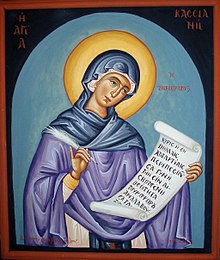 Kassiane, a ninth century nun and hymnographer. She was Irish, but her family moved to Constantinople, where she was one of several young women interviewed by Emperor Theophilus as his prospective bride. The story says he was so flummoxed by Kassiane’s beauty that he said something stupid (as men have been known to do): “From a woman came forth the baser instincts”, that is from Eve. Not very romantic, you say? Kassiane who was bright and quick retorted, “Yes, and from a woman came forth the best thing of all”, that is, Christ. Theophilus was embarrassed at his ineptitude and chose someone else, but it was said he always regretted it.
Kassiane, a ninth century nun and hymnographer. She was Irish, but her family moved to Constantinople, where she was one of several young women interviewed by Emperor Theophilus as his prospective bride. The story says he was so flummoxed by Kassiane’s beauty that he said something stupid (as men have been known to do): “From a woman came forth the baser instincts”, that is from Eve. Not very romantic, you say? Kassiane who was bright and quick retorted, “Yes, and from a woman came forth the best thing of all”, that is, Christ. Theophilus was embarrassed at his ineptitude and chose someone else, but it was said he always regretted it.
Kassiane became a nun, founded a monastery near Constantinople, and wrote many hymns, including tonight’s about the sinful woman who anointed Christ. It is said that late in life the Emperor went to the monastery hoping to see Kassiane once more. She hid, leaving her unfinished hymn, her love song to Christ, on the table, and when the Emperor had left she found he had completed it. Perhaps a legend, but it’s a lovely story, and a very lovely hymn – sung here by the Boston Byzantine Choir.
“O Lord God, the woman who had fallen into many sins, having perceived Thy divinity, received the rank of ointment-bearer, offering Thee spices before Thy burial wailing and crying: “Woe is me, for the love of adultery and sin hath given me a dark and lightless night; accept the fountains of my tears. O Thou Who drawest the waters of the sea by the clouds, incline to the sigh of my heart. O Thou Who didst bend the heavens by Thine inapprehendible condescension, I will kiss Thy pure feet and I will wipe them with my tresses. I will kiss Thy feet Whose tread when it fell on the ears of Eve in Paradise dismayed her so that she hid herself for of fear. Who then shall examine the multitude of my sin and the depth of Thy judgment? Wherefore, O my Saviour and the Deliverer of my soul, turn not away from Thy handmaiden, O Thou of boundless mercy”.
Gospel reading:John 12:17-50
Last night we heard Saint Matthew’s account of the end of Jesus’ public ministry. Now we hear John’s version which is quite different. I see no discrepancy. Far more happened than could be written down, so all four Gospels are “condensed versions” from different perspectives. Young John had been Jesus’ closest friend and confidante and no doubt got the “inside story”. Also I think John, writing after the others, was adding stories omitted by Matthew, Mark and Luke which he felt were too good to be lost.
All John tells us of the Holy Week confrontations is the final complaint of the Pharisees: “We’re getting nowhere. The world has gone after him”.
“The world”: Now some Greeks (Greek speaking Jews? Greeks sympathetic to Judaism?) who were in the city for the feast came saying, “We want to see Jesus”. They went to Philip (a Greek name) who went to Andrew (Andreas, also a Greek name) who told Jesus.
The Lord took this as a sign that his ministry to the Jews was over. Now it was time to move on and give his life for the life of the whole world. “The hour has come for the Son of Man to be glorified.” He will be a grain of wheat that falls to the ground, so it may produce a great harvest.
Kolyva (Κολλυβα in Greek), the wheat which we use at memorials for the  dead (shown here surrounded by flowers with a picture of the departed loved one) was originally a pagan symbol, but Christ gave it new meaning: He is the seed planted in the earth from which new and greater life springs up – his Death and Resurrection. So shall we be in our death and resurrection.
dead (shown here surrounded by flowers with a picture of the departed loved one) was originally a pagan symbol, but Christ gave it new meaning: He is the seed planted in the earth from which new and greater life springs up – his Death and Resurrection. So shall we be in our death and resurrection.
He continued: “Shall I say, Father, save me from this hour? No”, he said almost to himself, “This is why I came to this hour. Father glorify thy name.” A voice was heard: “I have glorified it, and I will glorify it again.” Thunder? the voice of an angel? Jesus said, “This voice has come for your sake…Now is the judgment of this world. Now shall the ruler of this world [Satan] be cast out, and I when I am lifted up from the earth will draw all the world to myself.” And here we are, brothers and sisters, thousands of miles away and twenty centuries later, still drawn to him by his love lifted up on the Cross.
His hearers didn’t understand – little wonder. “But isn’t the Christ supposed to remain forever? Who is this Son of Man? What is this ‘being lifted up'”? He gives no answer. He is done with words. Now he will show them. He says only, “A little while longer the light is with you. Walk in the light while you have the light, that you may become sons of light.” Then he departed and “was hidden from them”. His public ministry was over.
Then John adds his own commentary written many years later when it had become clear that the Jews as a people were not going to believe in Jesus Christ – though he had given them so many signs that he 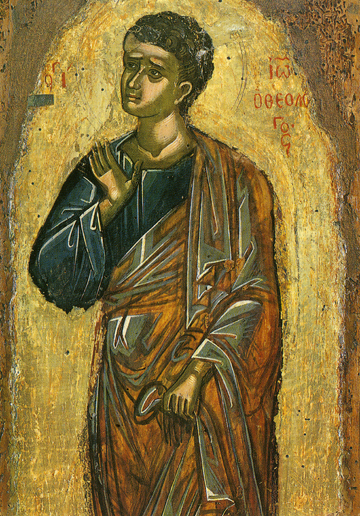 was their Messiah. John says this fulfilled the prophecy of Isaiah: God has “blinded their eyes, hardened their hearts lest they should see and understand”. But that was no explanation for their unbelief. John had no explanation. Though he adds that even some of the rulers did believe but didn’t admit it lest they be cast out of the synagog, for “they loved the praise of men more than the praise of God” – and that was even worse.
was their Messiah. John says this fulfilled the prophecy of Isaiah: God has “blinded their eyes, hardened their hearts lest they should see and understand”. But that was no explanation for their unbelief. John had no explanation. Though he adds that even some of the rulers did believe but didn’t admit it lest they be cast out of the synagog, for “they loved the praise of men more than the praise of God” – and that was even worse.
Then John returns to the story – and this is so poignant: Jesus cried out. This was in private. I wonder if only his beloved John was there to hear it. He cried out in grief. He had known from the beginning he would be rejected, but that didn’t mean it didn’t hurt. Even if we know something terrible is going to happen, it still hurts, indeed all the worse for knowing it is coming. But it wasn’t only the Jews who caused him to cry out, was it? It was all who would turn away from him and his love, and that’s all of us sometimes, isn’t it?
Jesus looked back and summed up his ministry and his “identity”: “He who believes in me believes in him who sent me”. “He who sees me sees him who sent me”. “I have come as light to the world, so people might not walk in darkness”. “If anyone does not believe in me I do not judge him.” I came not to judge but to save. But what 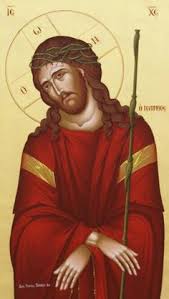 have spoken will judge him on the last day.” “For I have not spoken on my own authority. I have said only what the Father told me to say, and I know that in it is everlasting life.”
have spoken will judge him on the last day.” “For I have not spoken on my own authority. I have said only what the Father told me to say, and I know that in it is everlasting life.”
To reject Christ, to consciously reject his word is to “reject everlasting life”. For Christ is God and God is life and only in God is life. “I am the resurrection, I am life”, he had said. Then he repeats: “I have spoken only what the Father told me to say.” As if, even though he knew what would happen, he couldn’t accept it, couldn’t believe it. How was it possible that they could reject something so beautiful, so life-giving, so true, so obvious? Yet there it was. And it was breaking his heart.
I think this is Jesus at his most “human”, and the most heart-wrenching passage in the Gospels.
It was now Tuesday night. Tomorrow Judas will go to the authorities and ask, “What will you give me if I deliver him to you?”
Holy Wednesday morning Liturgy of the Presanctified Gifts
Gospel: Matthew 26:6-16
A short Gospel reading in Holy Week!
Matthew repeats the story we heard Sunday from John, about Christ being anointed with fragrant oil. John said Mary sister of Martha did the anointing. Matthew says only that it was “a woman”. Luke places this earlier in Jesus’ ministry and says it was done by a sinful woman. (How to harmonize these? I don’t know.)
Then Judas Iscariot went to the chief priests and said, “What will you give me if I deliver him to you?” They gave him thirty pieces of silver, and “from that time he sought opportunity to betray him.” This is why we keep Wednesdays as a fast day – for the betrayal.
 Judas is the most perplexing figure in the Holy Week story. Why did he do this? The only explanation the Gospels give is for money. Beginning Tuesday evening through Thursday evening we hear hymns about the greed of Judas that caused him to betray the Lord.
Judas is the most perplexing figure in the Holy Week story. Why did he do this? The only explanation the Gospels give is for money. Beginning Tuesday evening through Thursday evening we hear hymns about the greed of Judas that caused him to betray the Lord.
People have speculated that surely Judas couldn’t have betrayed him only for money, and the Gospel accounts leave openings for additional possibilities.
John says at the Last Supper, after Jesus gave Judas a piece of bread (a traditional sign of friendship, affection – imagine!), then “Satan entered into him”, and Jesus said to him, “What you do, do quickly.” John, sitting close to Jesus, must have heard this. It sounds almost as if the betrayal had been arranged between Jesus and Judas. Or did Judas take this as a secret sign that Jesus wanted him to betray him in time for the Passover? Or was Jesus just tell telling Judas that he knew what he was up to?
Matthew, Mark and Luke all quote the Lord saying, “The Son of Man goes as it is written  of him, but woe to the man by whom he is betrayed.” But Judas couldn’t have been “fated” to do this. Christ who loves all mankind does not set anyone up for woe, for hell, not even Judas. And Satan does not enter into anyone unless they let him in. So this explanation still leaves us hanging.
of him, but woe to the man by whom he is betrayed.” But Judas couldn’t have been “fated” to do this. Christ who loves all mankind does not set anyone up for woe, for hell, not even Judas. And Satan does not enter into anyone unless they let him in. So this explanation still leaves us hanging.
Or maybe it was because Judas lost faith in Jesus. He had believed, but then they came to Jerusalem and Jesus didn’t cast out the Romans and bring in the Jewish kingdom and showed no sign of doing it. Judas concluded: I was wrong, he’s not the Messiah, and quickly to save his skin he changed sides and went to the authorities. Perhaps.
Some speculate that Judas never had faith in him as Son of God. “Jesus Christ Superstar” (that peculiar but occasionally profound musical from the 70s) theorized that Judas saw him only as a beneficent “good samaritan”, as indeed he was. But as time went on it had become less about helping people and more about Jesus himself: Who do men say that I am? Distressed at this Judas turned on him. At the end of “Superstar” Judas is dead and Christ is risen, and Judas sings: Did you know what you were doing all along? were you really the Messiah? Perhaps.
But the Gospel accounts and the Church’s hymns suggest only that greed was behind it. Was greed Judas’ “passion”, as we Orthodox call it? Remember how John wrote that Judas used to steal from the common moneybag. We know, we see how greed – lust for money, for things – can cause people, financiers, CEOs and ordinary folks who must have everything now, to do irrational things, and how they can destroy themselves and others in the process. You know that at critical moments our passions often come at us in force – and we lose our tempers again or fall again into despair or turn to drink or drugs or food or sex or shopping – or to money.
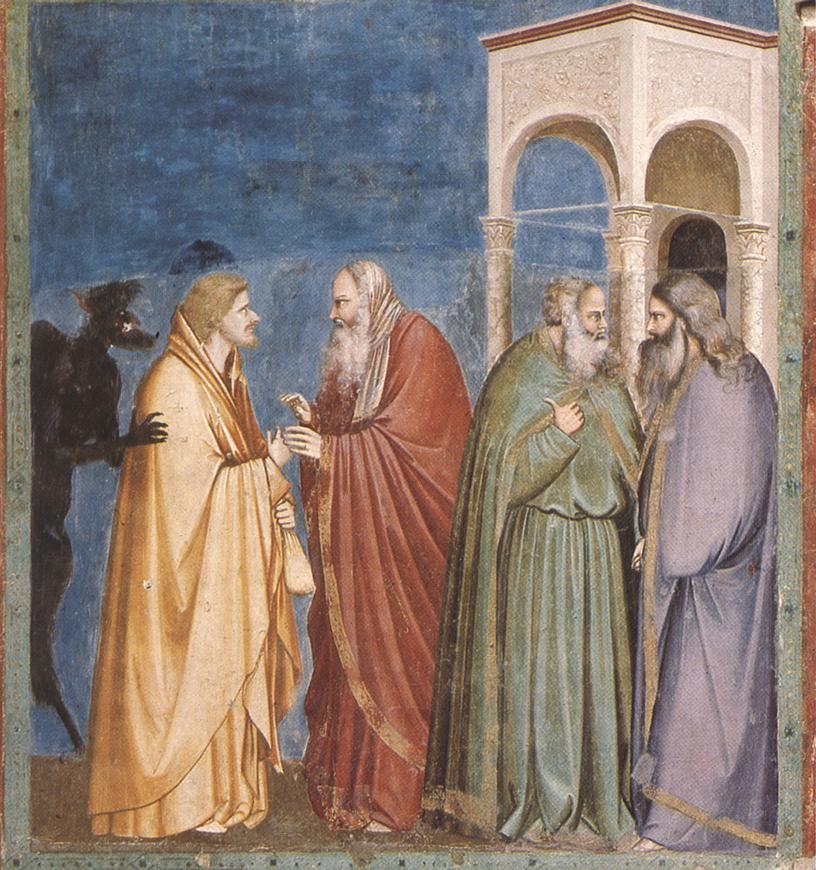 Imagine Judas, now utterly confused: Nothing is going the way he thought. Is he wrong about Jesus? Is he right? He has no idea and he’s had no sleep all week, tossing and turning, at his wits’ end. So now at this most critical moment the devil attacks: Judas’ besetting sin comes at him. His mind goes dark. He has no idea what to do next – but maybe money will help me cope, money will feel so good, nice familiar comforting soothing money. Was that it?
Imagine Judas, now utterly confused: Nothing is going the way he thought. Is he wrong about Jesus? Is he right? He has no idea and he’s had no sleep all week, tossing and turning, at his wits’ end. So now at this most critical moment the devil attacks: Judas’ besetting sin comes at him. His mind goes dark. He has no idea what to do next – but maybe money will help me cope, money will feel so good, nice familiar comforting soothing money. Was that it?
Listen to the words of a Holy Thursday hymn: Judas darkened by the disease of greed delivered thee, the righteous Judge to lawless judges. You who love money, see how for money’s sake he hanged himself. Flee from the greed which made him do such things against his Master.
And we know he betrayed the Lord and took money for it, thirty pieces of silver – and that after the Crucifixion Judas tried to give the money back. Apparently all he could think to do to try to get out from under this horrible burden of guilt was: Get rid of the money. The chief priests piously refused it: “It’s illegal to take back blood money.” Lord, have mercy – as if it had been legal for them to give a bribe to betray this innocent man. That hadn’t troubled them, had it? And we know 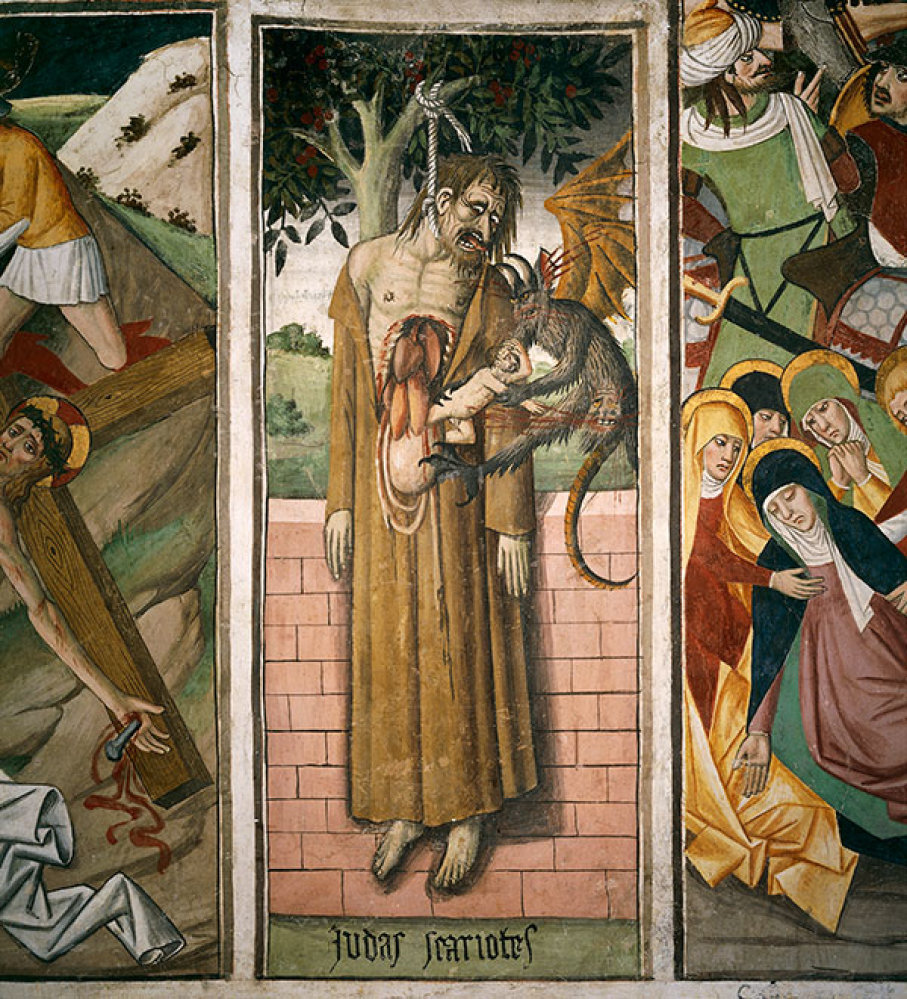 Judas threw the money down and ran away: he had to get rid of that money! He left and soon was dead. Matthew says he hanged himself. The Book of Acts says he fell and ripped himself open on a rock “and all his bowels gushed out…”
Judas threw the money down and ran away: he had to get rid of that money! He left and soon was dead. Matthew says he hanged himself. The Book of Acts says he fell and ripped himself open on a rock “and all his bowels gushed out…”
Judas betrayed Jesus, lost all hope, turned away and died in despair. The hymns today compare Judas with the sinful woman who anointed Jesus’ feet with her hair, who repented and was forgiven. Hers was a simple story: She was a sinner and she knew it. So she turned to Christ and repented. No complex motivations as with Judas, and hers was a happy ending. “There is joy in heaven over one sinner who repents.” Likewise Simon Peter denied Christ three times, but returned in repentance and was forgiven. We honor him as Saint Peter.
What if, like the sinful woman, like Peter, Judas had repented? What if he had come to the risen Christ asking forgiveness? Hanging in our churches, would we now have icons of Saint Judas?
We will never know, for Judas did not repent.
Next: Holy Wednesday night Matins and Anointing, Holy Thursday Divine Liturgy
